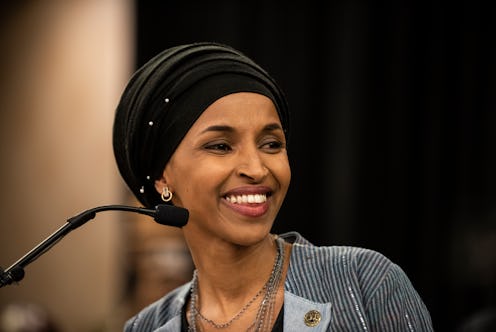News
Ivanka Spoke Up About Democrats' Push To Change Religious Headwear Rules In The House

In a tweet on Monday, White House adviser Ivanka Trump expressed support for Ilhan Omar to wear the hijab in Congress. For the past 181 years, lawmakers were barred from wearing any sort of headwear in the House of Representatives. But Democrats are seeking to change that rule in order to accommodate the religious practices of Omar, one of the first Muslim women elected to Congress. Trump called it an "important rule change" on Monday.
Bustle has reached out to the White House for comment. House Democratic Leader Nancy Pelosi, Democrat Massachusetts Rep. Jim McGovern, and Omar herself were behind the proposal to lift the headwear ban from the House. In their official text, the Democrats said the potential clarification to the rule would "ensure religious expression."
According to The Washington Post, the proposal came along with a pledge from the Democrats to promote more diversity on Capitol Hill and work on tackling discrimination based on sexuality and gender.
Omar had tweeted about the Democrats' plan to overhaul the 181-year-old rule in the House on Saturday. "No one puts a scarf on my head but me," the Minnesota Democrat tweeted. "It's my choice — one protected by the First Amendment. And this is not the last ban I'm going to work to lift." If implemented, it is unclear if other members in the House would also take advantage of the change.
The proposal comes under the Democrats' plan to "restore inclusion and diversity" in the Congress. According to the text of the proposal, "Public servants working for the People's House should reflect the faces of America. The Democratic rules package will provide an opportunity for all Americans to be included in this great institution."
Under their proposed plan, Democrats said that they would focus on the American credit rating, fight against Republicans' budget process, retain public lands, and work on instilling stability in budgetary rules.
The Democrats said that they sought the advice and suggestions of stakeholders for their proposed plan while also engaging with their colleagues at a bipartisan level. It's a work in progress as lawmakers involved in the proposal will now seek the feedback and input from their colleagues. This would also include Pelosi, McGovern, and Omar's proposal for allowing headwear in the Congress. (The other Muslim woman elected to the Congress, Rashida Tlaib of Michigan, does not wear the hijab.)
The current regulation on headwear in the Congress is based on an 1837 ruling. Under this particular stipulation, "every member shall remain uncovered during the sessions of the House." There is a possibility that the wording of the rule could be interpreted and consequently applied to Omar's case, meaning that she could be barred from entering the Congress while wearing a hijab.
With a change to that rule in the works, those who wear certain kinds of religious apparel — including kippahs and the like — will have the ability to practice not only their religion but also their public duty as representatives without trouble.